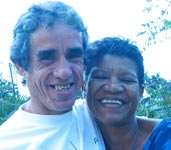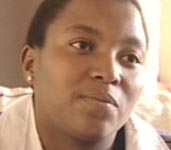It's easy to forget amid the overwhelming statistics -- 40 million infected, 25 million dead, 12 million orphans in Africa alone -- that the grassroots battle against HIV/AIDS happens every day in the bodies of infected people worldwide. In their own words, here are the stories of five of them:
|
BRAZIL Maria Lúcia da Silva ("Lúcia") and Laerte Vicente, a middle-aged couple in Brazil, did not know each other when they were diagnosed but have since formed a life together. Nothing about living with HIV is easy -- they still fight against stigma every day -- but a particular challenge is negotiating their different feelings about sex after HIV. |
U.S. William W. Dodge IV ("Dodge"), a 40-year-old gay man in the United States, is a pioneer: He volunteered in February 1996 for the study that produced the first successful HIV treatment. AIDS-free for 10 years, here he tells the story of how he became "patient no. 9" in that groundbreaking trial. He's now facing the end of the study -- and life without the doctors who have kept him healthy. |
SOUTH AFRICA Dorothy Maksalatiba, a middle-aged woman in South Africa, didn't believe HIV existed until shortly before she and her son were diagnosed. Her family's life has been transformed since antiretroviral drugs were made available under President Bush's Emergency Plan for AIDS Relief (PEPFAR), but the $15 billion program is funded for only five years. |
CHINA "Thomas," a young man in China, struggled to find a way to get antiretroviral treatment as he approached death, and eventually his family spent their life savings to keep him alive. Now he works to make sure other HIV-positive Chinese don't have to fight as hard as he did. |



